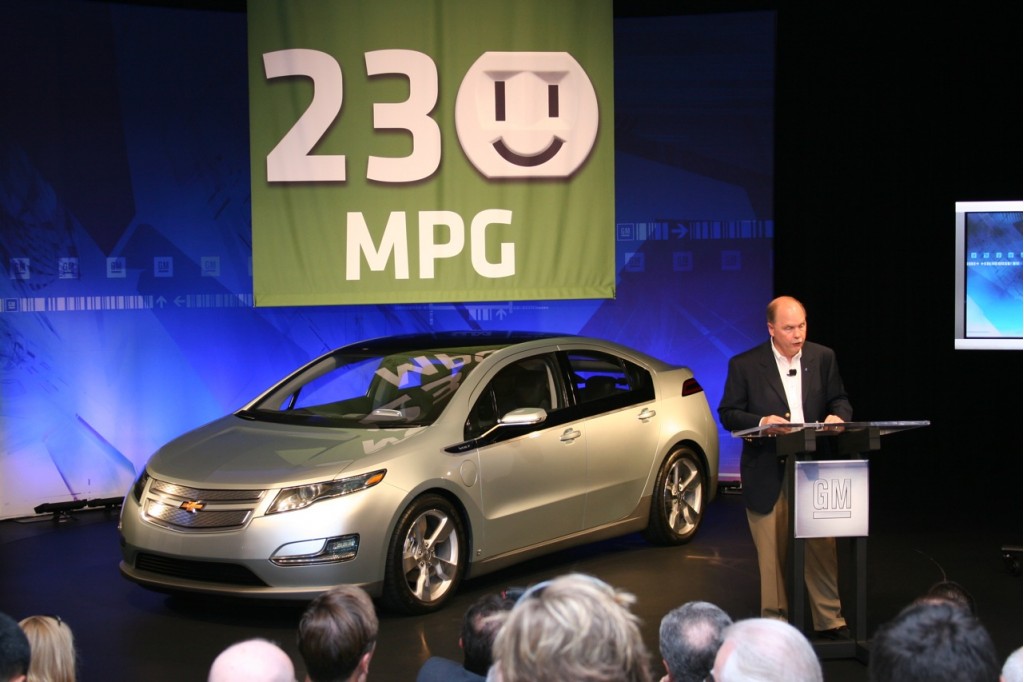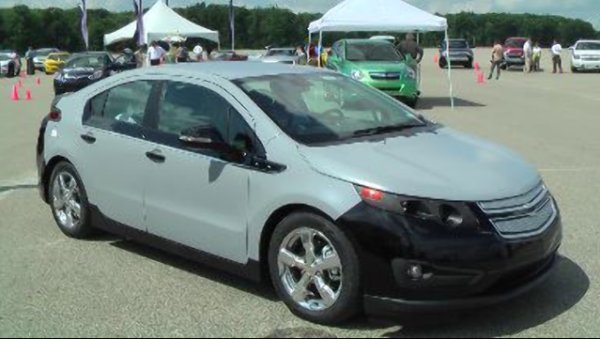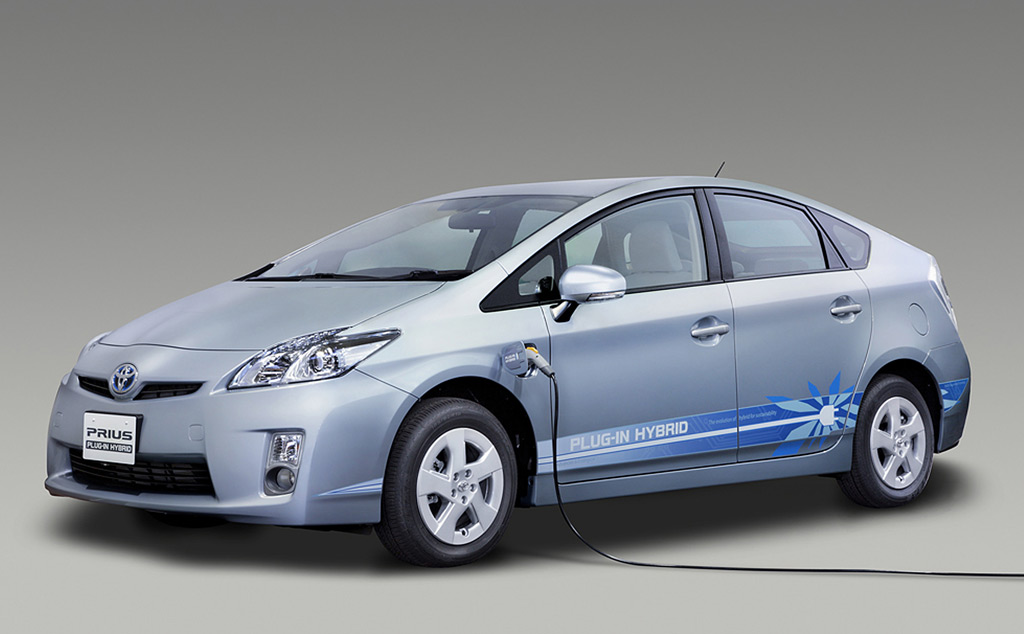Toyota and GM are the auto industry's heavyweights. Each has stumbled this year; General Motors collapsed into bankruptcy and Toyota is beset with embarrassing recalls that may dent its reputation for reliability.
Each also has a plug-in car coming. The 2011 Chevy Volt will hit dealers in less than a year's time, and a plug-in version of the Toyota Prius will be go on sale sometime before the end of 2011, with small numbers being tested in fleet use starting next month.

2010 Toyota Prius Plug-In Hybrid, 2009 Los Angeles Auto Show

2010 chevrolet volt 009

2010 Toyota Prius Plug-In Hybrid, 2009 Los Angeles Auto Show
So how do these two heavyweight plug-in cars stack up to each other?
BODY STYLE & SIZE
Both are five-door hatchbacks. The 2011 Chevrolet Volt is a compact, while the current Toyota Prius has enough interior space to qualify it as a midsize car. That aside, not a lot of differences.
TOTAL RANGE
Both plug-in vehicles offer a continuous range of more than 300 miles. In either case, your bladder may give out before the car's range does.
Chevrolet: The 2011 Volt will run at least 40 miles on electricity under any circumstances, plus "at least 300 more miles" using the 1.4-liter range-extender engine to generate electricity to power it, Volt vehicle line manager Tony Posawatz told us.
Toyota: The combined range of the Prius Plug-In Hybrid hasn't been revealed yet, but it could be more than 600 miles. That's definitely longer than most people can drive without stopping.
ELECTRIC RANGE
This will be the major difference consumers hear about. Chevrolet points out, over and over, that more than two-thirds of American cars run less than 40 miles a day--meaning a Volt might never use any gasoline if it's plugged in each night. The Prius Plug-In can't claim anything like that.
Toyota: The company quotes an electric range "up to 13 miles" for its Toyota Prius Plug-In Hybrid, at speeds up to 60 mph. But the real-world electric mileage will depend heavily on exactly how the car is used. Under some circumstances, that 13 miles may arrive in small segments, with the engine turned on in between.
Chevrolet: The 2011 Volt will run at least 40 miles on electricity under any circumstances, GM says--meaning, at highway speeds, carrying heavy loads, or in around-town stop-and-go use. And that figure is so well publicized that if the car doesn't live up to it, it'll be pilloried in the press.
HYBRID TECHNOLOGY
This is the biggest difference between the two cars. The Prius Plug-In remains a parallel (or "power-split") hybrid in which the engine and electric motors combine to power the wheels. But the 2011 Volt is a series hybrid, in which the wheels are driven solely by its electric motor.
Toyota: The Prius Plug-In Hybrid increases the battery pack capacity (from 1.6 to 4 kilowatt-hours), switching from the nickel-metal-hydride technology used in all Toyota hybrids to more compact lithium-ion cells. But it runs like a standard hybrid with a longer electric range. So the engine will switch itself on and off at will, including under high-speed conditions, heavy loads, at colder temperatures, and so forth.
Chevrolet: The engine of the 2011 Volt cannot power the wheels directly. The car's larger battery pack (16 kilowatt-hours, or 4 times the Prius Plug-In's) provides uninterrupted electric running for 40 miles, then the engine switches on to provide electric power to the wheels. The big question: Will the experience of pure electric drive for three times the distance give the Volt an edge over a Prius Plug-In engine that stops and starts whenever it wants?

2011 Chevrolet Volt
MARKETING
The two brands have a very basic difference: electric versus hybrid. Which brand will be able to grab the mantle of a "real electric car, without range anxiety"?
Chevrolet: We won't say anything more about the appalling Volt Dance. But Chevrolet positions the 2011 Volt as an electric car that also happens to come with a range-extending combustion engine. They've never once used the word "hybrid," which by now means "Toyota" to the public at large.

2010 Toyota Prius Plug-In Hybrid, 2009 Los Angeles Auto Show

Chevy Volt IVer

Toyota Prius Plug-in Hybrid
Toyota: The campaign for the 50-mpg 2010 Toyota Prius hybrid focuses on "Harmony Between Man, Machine, and Nature". Ignoring the bad grammar (it should be "among"), the theme extends Toyota's grasp on green credentials. But it says relatively little about actual electric running, which today's Prius can do for roughly 1 mile. Will Toyota market the Plug-In as an extension of the Prius range, or a totally different vehicle?
PRICE
This is another big unknown. But with high-end 2010 Toyota Prius models stickering at more than $30,000, observers expect that both cars will do fine if they stay under $40,000.
Chevrolet: GM has steadfastly refused to comment on the price of the 2011 Chevy Volt, though rumors peg it at $35,000 to $40,000. The Volt is eligible for a maximum Federal tax credit of $7,500.
Toyota: The company said its plug-in will cost less than conversion kits from Hymotion and others that let a Prius plug in, which cost $10,000 or more. So it would likely go for $30,000 to $40,000, depending on standard features (probably toward the high end of the range). It's eligible for the minimum Federal tax credit of $2,500.
---------------
High Gear Media has partnered with Tesla Motors on a new writing contest where YOU can win a tour and road test of the 2010 Tesla Roadster Sport. You can submit as many articles as you like and enter multiple times. Enter now!













